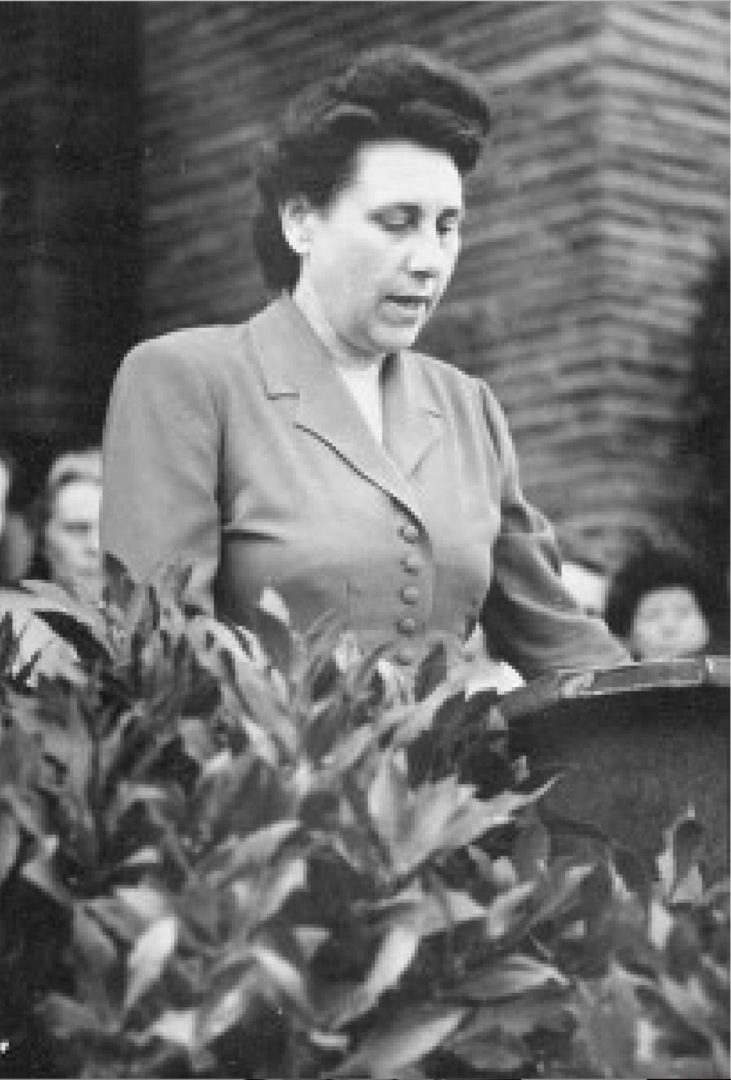The life, struggles and work of Christine Schröder is still an example for us all, but especially for younger people.
Nuray Boyraz - Soziale Liste BochumRead more:
† 02.02.1980 in
Nationality at birth: Deutsch
Nationality at death: Deutsch
Franz Schröder
* 10.02.1898† 17.04.1977
Josef "Menne" Schröder
* 02.06.1919† 1990
Place of the fight for human rights: Bochum
| Area | Type | From | To | Location |
|---|---|---|---|---|
| Zementfabrik | Arbeiterin |
KPD
Location: BochumReason for entry: politische Überzeugung
Function / Activity: nach dem Krieg Stadtverordnete bis zum Parteiverbot 1956
VVN
Location: BochumReason for entry: Faschismus und Krieg darf sich nie wiederholen, Wiedergutmachung
Function / Activity: 1947-1952 stellvertretene Vorsitzende, 1952-1966 Vorsitzende VVN Bochum
DKP
Location: BochumReason for entry: politische Überzeugung
Function / Activity: Mitbegründerin DKP Bochum
Leitmotif
How did the story become known?
Durch Publikationen
Where did the story become known?
Bochum
By whom did the story become known?
Günter Gleising und Klaus Kunold
Literature (literature, films, websites etc.)
Die VVN zwischen Kontinuität des Widerstandes gegen Hitler und Neuorientierung des Antifaschismus, Entnazifizierung, Restauration, Kalter Krieg, Neofaschismus und Entspannungspolitik. Bochum und Wattenscheid 1945 – 1972. Günter Gleising unter Mitarbeit von Klaus Kunold, Ruhr Echo Verlag, 2008, ISBN: 978-3-931999-13-1
Wider das Vergessen, Widerstand und Verfolgung Bochumer Frauen und Zwangsarbeiterinnen 1933-1945. Buchreihe Zeitzeugen – Zeitdokumente. Band 18. Hrsg. v. Karin Finkbohner, Betti Helbing, Carola Horn, Anika Krämer, Astrid Schmidt-Ritter, Kathy Vowe, Projektgruppe “Wider das Vergessen” im Frauenverband Courage e.V., Europäischer Universitätsverlag, ISBN 9783932329586, S. 33-38.
“Christine Schröder – ein Portrait”, antifaschistische Bochumer Blätter, Nr 1/2016, Seite 8.
Testimony / Witness before / in
Prohibition of torture or cruel, inhuman treatment
Prohibition of arbitrary arrest or expulsion
Freedom of assembly and association
Right to paid work, equal pay for work of equal value
The right to adequate living conditions, to safety in case of unemployment, to illness, to disability, to widowhood and to old age, to protection of mothers and children
Right to truth

INTRODUCTION
Christine Schröder was a Bochum communist, anti-fascist and welfare politician. Because of her resistance against the Nazi-unjust state, she was imprisoned several times and severely maltreated. After the Second World War, she worked intensively for remembrance, the widest possible coming to terms with the atrocities and reparations.
THE STORY
Christine Schröder (1900-1980)
Resistance fighter against the Nazi regime in Bochum
Christine Schröder née Giboni was born in 1900 as the child of a Bochum working class family. As a result, she too had to do hard physical labor in a cement factory at a young age.
At the age of nineteen she married the miner Franz Schröder. The couple had a son (Josef “Menne” Schröder) and lived in a Bochum working class district – one of the so-called “red districts” – with a view of the blast furnaces and within hearing distance of the forge hammers of the Bochumer Verein (1). Early on, she regularly took part in rallies and demonstrations for workers’ rights. One year after their marriage, her husband founded the Bochum KPD, which Christine Schröder then joined in 1928. The couple fought intensively against the rising fascism. Thus Christine Schröder, together with many thousands of Bochum citizens, took part in a demonstration against the coup d’état in Prussia (3) on July 20, 1932, at what was then Moltkeplatz (2).
Shortly after the Nazis’ so-called seizure of power, Christine Schröder was imprisoned for 27 days in Bochum police prison in the summer of 1933 because of her political activities (4). In 1978 she was awarded the Medal of Honour of the German Resistance. Christine Schröder died shortly after her eightieth birthday on 2 February 1980.
A request by the Social List Bochum in 2010 to name a street in Bochum after Christine Schröder was not accepted.
Author: Daniela Collette
Photo: The picture was kindly provided by Günter Gleisig, VVN-BdA Bochum, Soziale Liste Bochum
The next arrest by the SS followed in April 1934 (5). After her release in May 1934 Christine Schröder continued to fight in the anti-fascist resistance. Here she maintained contact above all with the resistance fighters of the Bochumer Verein and took over courier services.
In the same year (1934), after a resistance group in the Ruhr area was uncovered, the Gestapo made a large wave of arrests in Herne, Bochum, Wattenscheid and Essen. In this context Christine Schröder was also arrested again on the charge of “preparation for high treason”. Many members of the resistance group were brutally abused and tortured. Karl Springer, the head of the group, was beaten to death by the Nazis in the Bochum police prison. Christine Schröder was also severely mistreated during her imprisonment. She suffered permanent damage from brutal kicks in the abdomen and was barren from now on.
After about two and a half years of protective and pre-trial detention, she was sentenced on 10 April 1937. Christine Schröder was imprisoned first in Hamm and later in the Ziegenhain women’s prison. (6)
Despite the mistreatment and the long period of imprisonment, she resumed the fight against fascism after her release on April 7, 1938.
After a bomb attack on June 26, 1943, the Schröder family was evacuated to Bavaria in the Bamberg district. Their son Josef was meanwhile a prisoner of war, from which he returned in the summer of 1945. The family could only return to Bochum in 1947.
Immediately after his return, Christine Schröder resumed her political work in the KPD and she represented the party in the Bochum city council. As active communists, the Schröder family also experienced further repression during the cold war. Their son Josef Schröder was released in the course of the KPD ban in 1956 and imprisoned for twenty months. With the ban of the KPD Christine Schröder’s activity in the Bochum city council ended. In 1968 she was involved in the foundation of the German Communist Party (DKP) in Bochum. She also became active in 1947 in the VVN Bochum, which had been founded shortly before (7) and became deputy chairwoman and then, from 1952 to 1966, first chairwoman of the VVN Bochum (later VVN-BdA).
She worked tirelessly for the reparation of those persecuted by the Nazi regime and helped these people to write reparation petitions. As an important contemporary witness, she passed on her experiences and stories of fascism to young people. But she also fought for her own reparation for a lifetime, as she suffered from permanent abdominal and headaches due to the torture and abuse.
In the compensation file kept in the State Archives of Münster (Reg. Bezirk Arnsberg No. 23192) it says: “It is today assumed to be implausible that any men at all could have behaved so brutally towards women in those days. Today, one no longer wants to know anything about the real criminals, because they were covered up at that time. (…) I’m filing a complaint against your pension assessment, not only for the sake of the pension, but also because of the way we are being treated and judged today.
Christine Schröder also repeatedly emphasized the psychological consequences of imprisonment, torture and persecution, which were not taken into account in the medical reports until the end of the 1960s.
Despite severe heart disease (she suffered several heart attacks), Christine Schröder, who was described as warm and fun-loving, remained politically interested and active until shortly before her death. In 1978 she was awarded the Medal of Honour of the German Resistance. Christine Schröder died shortly after her eightieth birthday on 2 February 1980.
A request by the Social List Bochum in 2010 to name a street in Bochum after Christine Schröder was not accepted.
Author: Daniela Collette
Photo: The picture was kindly provided by Günter Gleisig, VVN-BdA Bochum, Soziale Liste Bochum






